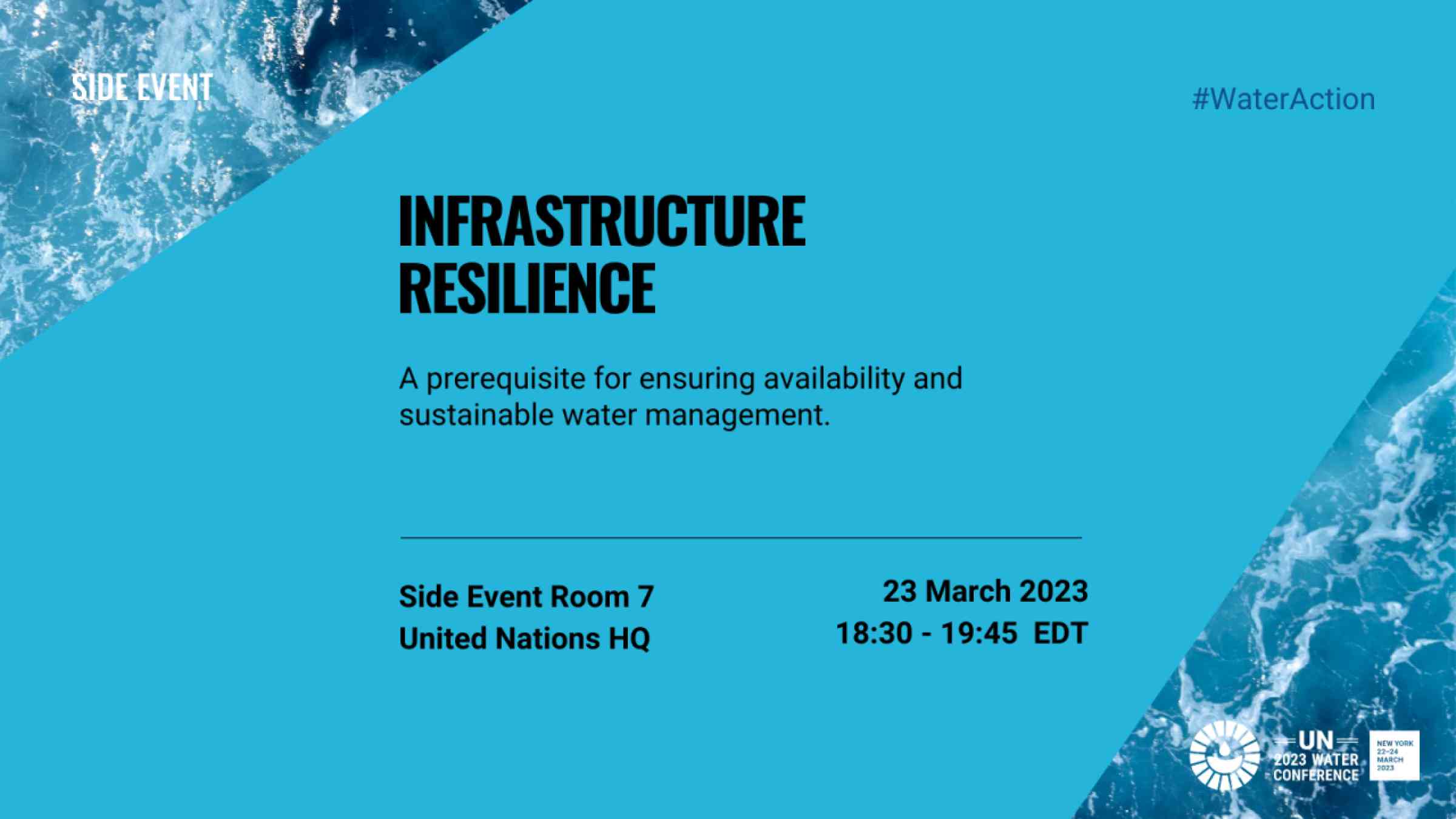Infrastructure Resilience – A Prerequisite for ensuring availability and sustainable water management

United Nations Headquarters, Side Event Room 7
- English
Time
18:30 - 19:45 pm
About
Most hazards are directly or indirectly linked to water (e.g., flood, drought, typhoons/ cyclones, flash floods, landslides, and water quality emergencies). Over the last two decades, floods and droughts have affected more than 3 billion people. Disasters related to weather, climate, or water hazards have caused an average loss of US$ 202 million every day for the past 50 years[1].
At the same time, disasters can have significant impacts on water infrastructure. Nearly 95% of infrastructure loss and damage reported between 2010 and 2019 were due to water-related disasters. This has dire social consequences, for instance in terms of health risks, but also significant economic fallout and potential environmental damage, and can further exacerbate vulnerability to hazards.
Enhancing the resilience of water infrastructure and reducing disaster risks is paramount to achieving SDG 6 on clean water and sanitation. However, there are major barriers and challenges that have prevented progress in terms of water infrastructure resiliency, such as short-term thinking and planning which externalizes future risk creation, lack of local institutional capacity, inadequate policy and regulatory frameworks and capacity to enforce them, and insufficient investment, to name just a few. Additionally, the finance gap for making all water services climate resilient is growing.
In line with UN 2023 Water Conference interactive dialogue number 3: Water for Climate, Resilience and Environment, the side-event will showcase the interdependencies between water systems and other infrastructure systems as well as linkages between climate change and disaster risk reduction, highlighting the importance of infrastructure resilience for the resilient, sustainable and equitable management and distribution of water.
Objectives
- Share experiences on concrete actions to improve water infrastructure resilience, including both structural and non-structural measures, such as nature-based solutions, new financial models, and present related commitments under the Water Action Agenda;
- Propose a set of good practices for water infrastructure resilience, building on the UNDRR Principles for Resilient Infrastructure and other relevant frameworks;
- Improve understanding of the inter-linkages between the water sector and other sectors (e.g. energy, transport, etc) and of possible cascading effects of disasters on infrastructure sectors;
- Explore ways to provide additional support at the national and urban levels for increasing resiliency of existing water infrastructure systems as well as reducing the impacts of water-related disasters on both water and other infrastructure systems, for example through the CDRI Water Resilience Programme;
- Consider linkages with the High-level Meeting of the General Assembly on the Midterm Review for the Sendai Framework for Disaster Risk Reduction and the 2023 UN SDG Summit.
Programme
- Moderator – Ms. Nathalie Olijslager, Programme Director for the UN 2023 Water Conference, Inclusive Green Growth Department, Ministry of Foreign Affairs of the Kingdom of the Netherlands
Welcoming Remarks
- Ms. Mami Mizutori, Special Representative of the UN Secretary-General for Disaster Risk Reduction and Head of UNDRR
Keynote Remarks
- Mr. Dennis van Peppen, Team lead International Water Programmes, Netherlands Enterprise Agency
Announcement of commitments and initiatives
Member States Perspectives
- Ms. Robyn Colosimo, United States Deputy Assistant Secretary of the Army
- The Honorable Lauren Moss, Minister for Environment, Climate Change and Water Security, Northern Territory Government of Australia
International Organisations, Stakeholder and Private Sector Perspectives
- Mr. Amit Prothi, Director General, Coalition for Disaster Resilient Infrastructure
- Mr. Stephan Sicards, Director, Division of Circular Economy and Environmental Protection, UNIDO
- Ms. Judith Kaspersma, Head of Department - Flood Risk Management, Deltares
- Mr. Bapon Fakhruddin, Water Sector Lead, Green Climate Fund
- Mr. Joep Verhagen, Global Lead Water and Urban, Global Center on Adaptation
- Ms. Sonia Thimmiah, Senior Director Global Sustainability, Heineken
Open Forum – Commitments/Questions by other Stakeholders
- Interventions from the floor
Closing
Co-organized by the United Nations Office for Disaster Risk Reduction (UNDRR), the Coalition for Disaster Resilient Infrastructure (CDRI), the United Nations Industrial Development Organization (UNIDO), the International Institute for Sustainable Development (IISD), the Green Climate Fund (GCF) and the Global Center on Adaptation (GCA)
In collaboration with the Ministry of Environment and Forestry (MOEF), Republic of Indonesia, the Permanent Mission of Australia to the UN in New York and the Permanent Mission of the United States of America to the UN in New York
[1]WMO (2021) at https://public.wmo.int/en/media/press-release/weather-related-disasters-increase-over-past-50-years-causing-more-damage-fewer